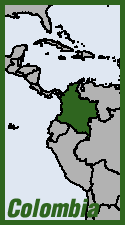 Colombia's President Juan Manuel Santos on May 9 called upon his National Drug Council to halt the spraying of glyphosate on suspected coca fields following its recent reclassification as a carcinogen by the World Health Organization. The decision to put an end to 20 years of the US-backed aerial spraying was applauded by leaders of the FARC guerillas. The spraying has long been opposed by the FARC as well as by Colombia's peasant communities. Santos' announcement came one week after government representatives and FARC leaders met in Havana for the 35th round of ongoing peace talks—this time to focus on justice and restitution for victims of Colombia's long civil war. (Colombia Reports, May 10; Prensa Latina, May 3)
Colombia's President Juan Manuel Santos on May 9 called upon his National Drug Council to halt the spraying of glyphosate on suspected coca fields following its recent reclassification as a carcinogen by the World Health Organization. The decision to put an end to 20 years of the US-backed aerial spraying was applauded by leaders of the FARC guerillas. The spraying has long been opposed by the FARC as well as by Colombia's peasant communities. Santos' announcement came one week after government representatives and FARC leaders met in Havana for the 35th round of ongoing peace talks—this time to focus on justice and restitution for victims of Colombia's long civil war. (Colombia Reports, May 10; Prensa Latina, May 3)
But the Havana talks resume as the war is heating up on the ground in Colombia. On April 14, four soliders were killed in an attack by FARC fighters at the hamlet of La Esperanza, Buenos Aires municipality, in the mountainous southern region of Cauca. Another 20 troops were injured in the assault with rifle-fire and improvised explosives. This was in violation of a unilateral ceasefire previously announced by the FARC leadership. It is uncertain if the FARC unit in the attack—identified by the government as the Miller Perdomo Mobile Column—was acting under orders or going rogue. A FARC communique on the incident was vague on the point, while expressing commitment to the peace process. In any event, the government responded by announcing that it would resume aerial bombardment of FARC positions—which had been called off in response to the guerilla ceasefire. No new air-strikes have been reported, but progress towards peace now appears in jeopardy. (El Tiempo, Colombia Reports, April 15)
April 10 saw another deadly incident in Cauca—this time in police repression of the region's indigenous land-recovery movement. During an occupation of La Emperatriz hacienda, an indigenous youth of 19 years, Siberston Guillermo Pavi Ramos, was shot by troops of the National Police force's feared Mobile Anti-Disturbance Squad (ESMAD). Cauca's indigenous movement issued a statement pledging to remain steadfast in the struggle, calling the "Liberation of Mother Earth" a "fundamental theme for us, and for humanity." (ACIN, April 18; ACIN, Colombia Informa, April 10; Pueblos en Camino, April 9; EFE, Feb. 28)
The war in Colombia could become an issue in the US presidential horserace. International Business Times noted on April 8 that as Hillary Clinton's State Department praised Colombia's supposed progress on human rights—permitting hundreds of millions of dollars in US aid to flow to the same Colombian military that was terrorizing peasants and labor activists—her family was forging a financial relationship with Pacific Rubiales, the giant Canadian petroleum company at the center of Colombia's labor strife. Pacific Rubiales and the company's founder, Canadian financier Frank Giustra, pledged millions of dollars into the Clinton Foundation. Giustra now holds a seat on the Foundation board.
Cross-post to High Times







Recent comments
3 weeks 4 days ago
3 weeks 4 days ago
6 weeks 5 days ago
7 weeks 4 days ago
11 weeks 4 days ago
15 weeks 3 days ago
19 weeks 3 days ago
20 weeks 1 day ago
30 weeks 1 day ago
34 weeks 2 days ago